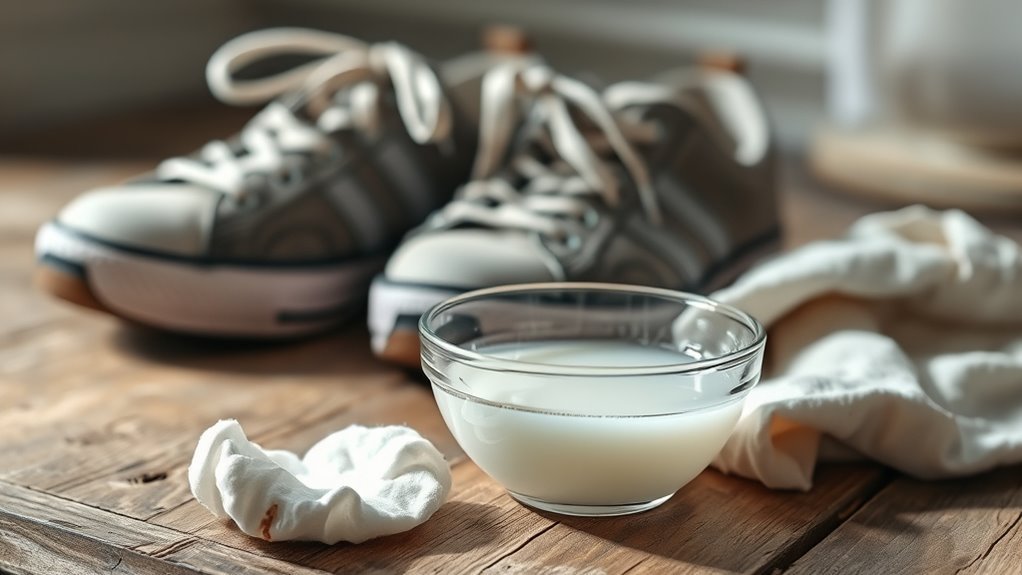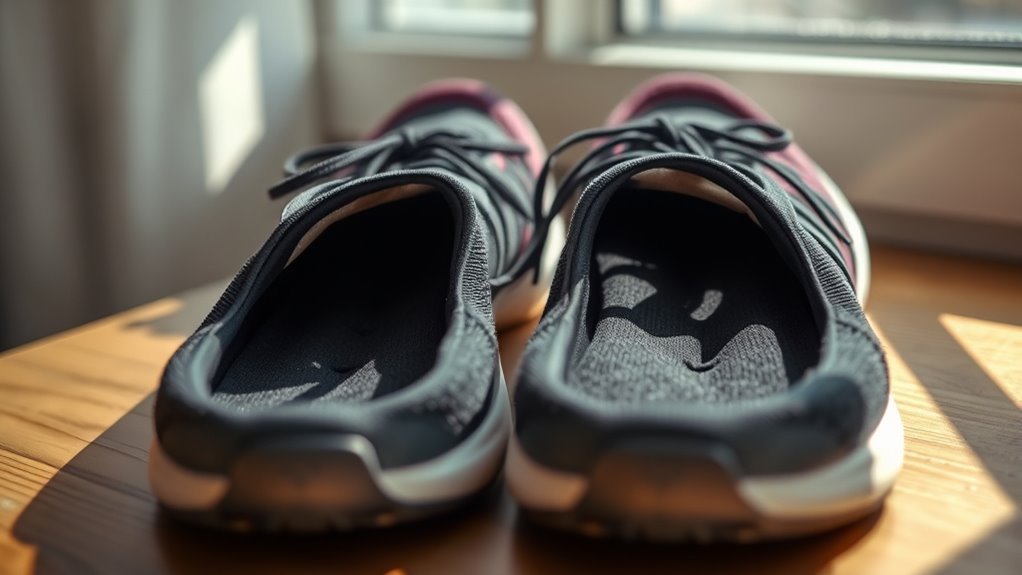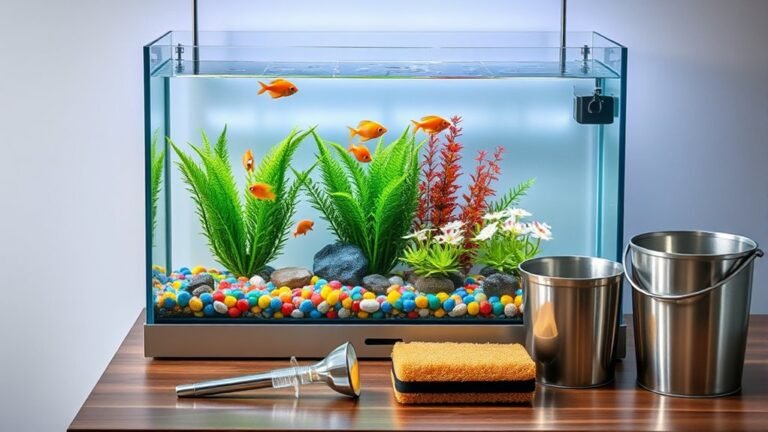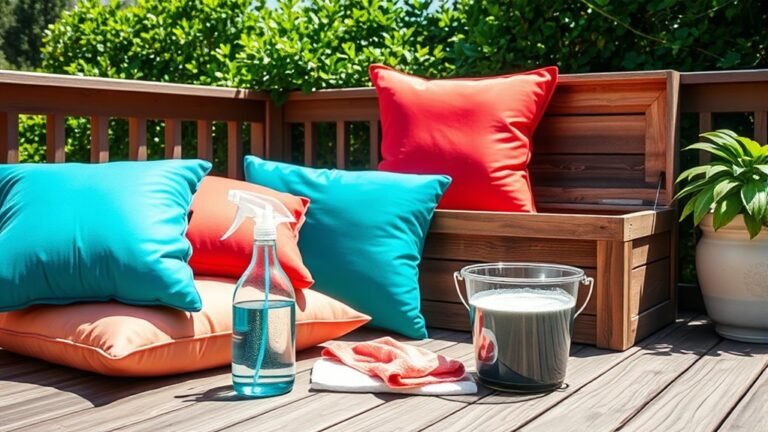How to Remove Odors From Shoes and Sneakers
You can remove odors from your shoes by tackling sweat and bacteria. Sprinkle baking soda inside overnight to absorb moisture, or mist with a water and white vinegar mix to neutralize smells. Freezing shoes in a sealed bag kills odor-causing bacteria, while activated charcoal inserts keep them fresh between uses. Choosing the right insoles with odor-fighting features also helps. These simple steps can make your shoes smell better quickly, and there’s more to explore for long-lasting freshness.
Common Causes of Shoe Odors

Although you might not notice it right away, several factors contribute to shoe odors, and understanding these causes is key to tackling the problem effectively. One major culprit is sweat accumulation. When your feet sweat, the moisture gets trapped inside your shoes, creating an ideal environment for bacteria to thrive. This bacteria breaks down sweat and skin cells, producing unpleasant smells. Another key factor is moisture buildup from rain, humidity, or even washing your shoes without thorough drying. The persistent dampness encourages fungal growth, worsening the odor. If you want the freedom to wear your favorite shoes without embarrassment, tackling sweat accumulation and moisture buildup is essential. Recognizing these causes helps you take smarter steps to keep your footwear fresh and your confidence high.
How to Use Baking Soda to Freshen Shoes
One simple and effective way to freshen your shoes is by using baking soda. This natural deodorizer absorbs moisture and neutralizes odors, making it a must-have in your shoe maintenance routine. Just sprinkle a generous amount of baking soda inside each shoe, covering the insole completely. Let it sit overnight or for at least 8 hours to work its magic. When you’re ready, shake out the excess powder or use a soft brush to remove any leftovers. Baking soda not only tackles stubborn smells but also helps keep your shoes dry, preventing bacteria buildup. Incorporating this easy step into your shoe maintenance frees you from unpleasant odors, so you can confidently step out without worry. It’s simple, natural, and effective—just what you need.
Applying White Vinegar for Odor Removal

Baking soda does a great job at absorbing odors, but if you’re looking for a more powerful solution, white vinegar can help. White vinegar is a natural odor neutralizer that tackles the root cause of shoe smells by killing bacteria and breaking down sweat residue. To use it, mix equal parts white vinegar and water in a spray bottle. Lightly mist the inside of your shoes without soaking them. Let them air dry completely in a well-ventilated area. This method refreshes your shoes without harsh chemicals, giving you the freedom to wear your favorites confidently. Just remember, avoid using white vinegar on delicate materials like suede, as it can damage the fabric. With this simple trick, your shoes will smell clean and fresh, freeing you from unwanted odors.
Freezing Shoes to Kill Bacteria
If your shoes smell bad because of bacteria, freezing them can help kill those germs. You’ll want to seal your shoes in a plastic bag and leave them in the freezer for at least 24 hours. This method slows bacterial growth and reduces odor without damaging your shoes.
Bacteria Elimination Process
Try freezing your shoes to kill the bacteria causing unpleasant odors. When you place your shoes in the freezer, the cold temperature halts bacterial growth by creating an environment where these odor-causing microbes can’t survive. This process is a natural way to achieve odor neutralization without relying on harsh chemicals, giving you freedom from synthetic solutions. Freezing targets the root cause of the smell—the bacteria—rather than just masking it. By disrupting their ability to multiply, you effectively reduce the source of the odor. This simple step lets you refresh your shoes and enjoy a cleaner, fresher experience every time you put them on. Embracing this method means taking control of shoe odors in a straightforward, chemical-free way.
Proper Freezing Techniques
Freezing your shoes can be highly effective for killing odor-causing bacteria, but doing it right makes all the difference. To liberate your feet from stink, you need to control the freezing duration and guarantee the ideal temperature is reached. Here’s how to get it right:
- Clean your shoes before freezing to remove surface dirt.
- Place your shoes in a sealed plastic bag to avoid moisture damage.
- Set your freezer to an ideal temperature of around -18°C (0°F).
- Freeze your shoes for at least 12 hours to kill bacteria effectively.
- Thaw shoes naturally at room temperature; avoid heat sources that might warp them.
Using Activated Charcoal Inserts

Activated charcoal inserts are great at absorbing moisture and odor, keeping your shoes fresh. You just place the inserts inside your shoes when you’re not wearing them. With minimal effort, they help prevent bad smells from building up over time.
Benefits of Activated Charcoal
Although it might seem simple, using charcoal inserts can make a big difference in keeping your shoes fresh. The activated charcoal benefits go beyond just masking smells—it actively traps and absorbs odors at their source. This natural odor absorption helps you enjoy a cleaner, more breathable shoe environment without harsh chemicals.
Here’s why activated charcoal inserts are a game-changer:
- Effectively absorbs moisture that causes odor buildup
- Neutralizes unpleasant smells rather than covering them
- Lightweight and easy to place in any shoe
- Chemical-free and eco-friendly solution
- Long-lasting with the ability to be reactivated by sunlight
How to Use Inserts
When you want to keep your shoes smelling fresh, using charcoal inserts is a simple and effective step you can take. These shoe inserts absorb moisture and trap odors, giving you freedom from embarrassing smells. Just slip them inside your shoes when you’re not wearing them, and let the activated charcoal do its magic.
Here’s a quick guide:
| Step | What to Do | Benefit |
|---|---|---|
| Insert | Place charcoal inserts inside shoes | Odor control starts immediately |
| Rest | Leave in shoes overnight or longer | Maximum absorption |
| Refresh | Expose inserts to sunlight monthly | Reactivates charcoal |
Using these inserts regularly keeps your shoes dry and fresh, so you can step out confidently every day.
Washing Machine Tips for Sneakers
Washing your sneakers in the machine can be a quick way to remove odors, but there are a few key tips to keep in mind to avoid damage. First, check the sneaker materials; not all fabrics or constructions can handle a machine wash. Then, adjust your machine settings to a gentle cycle with cold water to protect the shoes. Here are some tips to keep your sneakers safe and fresh:
- Remove laces and insoles before washing.
- Place sneakers in a mesh laundry bag for extra protection.
- Use a mild detergent to avoid harsh chemicals.
- Avoid the dryer; air dry to maintain shape and materials.
- Wash with towels to balance the load and reduce noise.
Follow these steps, and your sneakers will stay odor-free without losing their freedom.
Preventing Odors With Proper Shoe Care
Machine washing can help tackle sneaker odors, but keeping your shoes fresh starts long before they need a deep clean. You’ll want to focus on proper shoe care habits that prevent odor buildup. Start by ensuring good shoe storage—keeping your shoes in a well-ventilated area lets them breathe and reduces trapped moisture. Moisture control is key; never stash damp shoes in dark, enclosed spaces. Instead, dry your shoes thoroughly after use, and consider using moisture-absorbing inserts or silica packets to keep humidity at bay. Regularly airing out your shoes and rotating pairs prevents continuous wear and sweat accumulation. By adopting these simple steps, you’ll maintain a fresh, odor-free shoe collection and enjoy the freedom of stepping out confidently every day.
Choosing the Right Insoles for Odor Control
Although proper shoe care goes a long way, choosing the right insoles can make a significant difference in controlling odors. You’ll want to focus on insoles materials that offer excellent odor resistance and comfort. Here’s what to look for:
Choosing the right insoles boosts comfort and effectively controls shoe odor.
- Activated charcoal insoles: absorb moisture and neutralize odors naturally.
- Gel insoles with antimicrobial treatment: prevent bacteria growth effectively.
- Cork insoles: breathable and resistant to odor-causing microbes.
- Wool insoles: naturally wick away sweat while keeping your feet fresh.
- Bamboo fiber insoles: eco-friendly and highly odor-resistant.
Picking insoles with these features lets you enjoy freedom from stink and discomfort, keeping your shoes fresh no matter where your adventures take you. Don’t settle for less when it comes to foot freedom.
Frequently Asked Questions
Can Essential Oils Help Mask Shoe Odors Effectively?
You’ll find essential oils can help with odor masking by providing a natural, invigorating scent to your shoes. While they don’t eliminate the root cause of odors, they mask unpleasant smells effectively, giving you that freedom to wear your favorite kicks without worry. Just a few drops of oils like tea tree or lavender can transform your shoe’s smell, letting you enjoy fresh, confident steps wherever you go.
How Long Should Shoes Dry After Odor Treatment?
Did you know that improper drying can leave 20% of odors lingering? After odor treatment, you should let your shoes dry for at least 24 hours to fully eliminate moisture and bacteria. Using effective drying techniques—like stuffing them with newspaper or placing them in a well-ventilated area—speeds things up while keeping your shoes fresh. Taking your time guarantees you’re free to wear odorless shoes without worry or rush.
Are Odor-Removal Sprays Safe for All Shoe Materials?
You’ll want to check the spray ingredients before using any odor-removal spray, as not all are safe for every shoe material. Some sprays contain alcohol or harsh chemicals that can damage leather or suede. For fabric or synthetic sneakers, most sprays work fine, but always test a small area first. Knowing the material compatibility helps you keep your shoes fresh without risking damage, letting you stay free to wear what you love confidently.
Can Diet Affect Shoe Odor or Foot Smell?
Back in the days of knights and castles, your diet probably didn’t affect your foot smell, but nowadays, it sure can. When you make diet changes, like cutting down on spicy foods or adding more water-rich fruits, you might notice fresher feet. Pair that with good foot hygiene—like regular washing and drying—and you’ll feel more free from pesky odors. Your lifestyle choices truly influence how your shoes and feet smell.
Is It Necessary to Replace Shoes Due to Persistent Odor?
You don’t always have to replace shoes just because of persistent odor. With proper odor prevention, you can extend shoe longevity and keep them fresh longer. However, if the smell won’t budge despite your best efforts, or if the shoes are worn down and uncomfortable, it’s time to let them go. Prioritize your freedom to move comfortably and confidently—sometimes, fresh kicks are exactly what you need.






